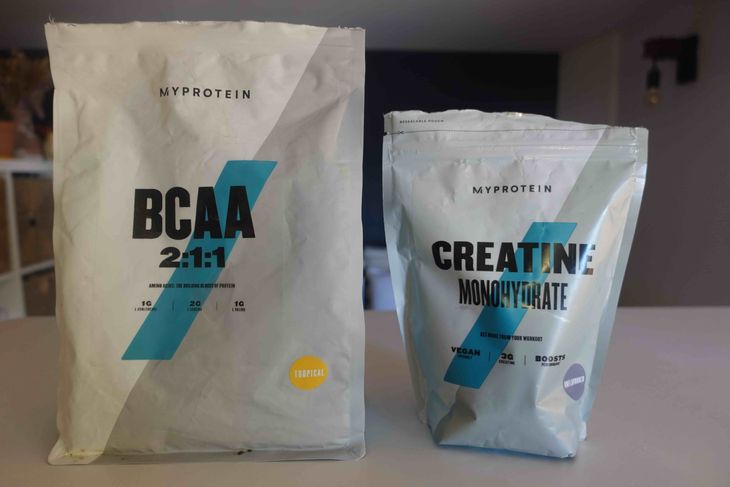BCAAs vs. Creatine: Which for Optimal Muscle Growth?

In the realm of fitness and bodybuilding, the quest for the most effective supplements to enhance muscle growth, strength, and overall performance is a perpetual journey.
Among the myriad of options available, two of the best supplements are Branched-Chain Amino Acids (BCAA) and Creatine. Both are hailed for their potential to elevate athletic prowess and aid in achieving specific goals.
Below, we delve into the intricacies of BCAA supplements and creatine supplements, deciphering their impact on muscle growth, protein synthesis, recovery, and overall athletic performance.
Understanding BCAAs and Creatine
Branched-Chain Amino Acids (BCAAs) are a group of three essential amino acids—leucine, isoleucine, and valine—that play a pivotal role in protein synthesis and serve as the building blocks of protein and muscle tissue. Unlike non-essential amino acids, which the body can synthesise from other molecules, we need to obtain essential amino acids from external sources (e.g., foods, supplements).

Creatine is an organic compound found in small amounts in certain foods and is synthesised in the body. Creatine is a key player in the production of adenosine triphosphate (ATP), the primary energy source for muscle contraction.
Therefore, the main difference between BCAAs and creatine lies in their distinct mechanisms of action, with BCAAs primarily influencing muscle protein synthesis and recovery, while creatine focuses on enhancing energy production for high-intensity performance.
Skeletal Muscle Growth and Protein Synthesis
Both BCAAs and creatine are believed to contribute significantly to muscle growth.
BCAAs, particularly leucine, stimulate muscle protein synthesis, promoting the creation of new muscle tissue. Leucine activates the mechanistic target of rapamycin (mTOR) pathway, a crucial regulator of protein synthesis, signalling the body to build and repair muscle cells.
Creatine, in contrast, supports muscle building by aiding in the production of ATP. During high-intensity exercises such as weight lifting or resistance training, the demand for energy is heightened. Creatine phosphate, a form of creatine stored in muscles, serves as a rapid source of ATP, providing the extra power needed for intense muscle contractions and contributing to the overall process of building muscle.
Muscle Recovery and Repair
Effective recovery is indispensable for consistent progress.
BCAAs, with their ability to reduce muscle soreness and accelerate recovery time, are valued companions for athletes engaged in rigorous training. By mitigating muscle breakdown and enhancing the repair process, BCAA supplementation can potentially reduce downtime between workouts, allowing individuals to maintain a more frequent and intense exercise routine.
Creatine, too, has demonstrated its prowess in facilitating muscle recovery. Its role in ATP production not only contributes to immediate energy needs during workouts but also aids in post-exercise recovery. Reduced muscle damage and enhanced repair mechanisms can lead to shorter recovery periods, enabling individuals to push their limits more frequently.
How BCAAs and creatine support recovery is also discussed in our article on the best supplements for women who want to build muscle.
Muscle Strength and Power Output
Muscle strength is a cornerstone of athletic performance, and both BCAAs and creatine have been associated with improvements in this domain. BCAAs, particularly leucine, contribute to muscle strength by promoting protein synthesis and aiding in the preservation of lean muscle mass. This can be especially beneficial for individuals aiming to enhance their strength while minimising the risk of muscle loss.
Creatine, renowned for its impact on high-intensity activities, augments muscle strength by providing the necessary energy for powerful muscle contractions. The increased availability of ATP allows individuals to exert more force during resistance training or explosive movements, thereby enhancing power output.
You might also like our articles on supplements for teen athletes to consider and the most popular supplements for increasing strength.
BCAA vs. Creatine: The Specifics
To determine the better choice between BCAAs and creatine, it's essential to scrutinise their specific roles and impacts on various aspects of fitness.

Muscle Size and Building
While BCAAs contribute to the development of lean muscle mass, the direct impact on overall muscle size might be more modest compared to creatine. Creatine, with its role in cellular hydration and increased water retention in muscle cells, can lead to more pronounced perceptions of muscle size.
Weight Gain
For those aiming for weight gain, creatine might be a more suitable ally. Its association with water retention can lead to an increase in overall body weight. While this may not necessarily translate to an increase in body fat, individuals on weight gain journeys may find creatine supplementation advantageous.
Fat Loss
BCAAs have garnered attention for their potential role in fat loss. By preserving lean muscle mass during caloric deficits, BCAAs may aid in maintaining metabolic rate and supporting fat burning. On the other hand, creatine's impact on fat loss is less direct, primarily focusing on rapid energy production during high-intensity exercises rather than influencing metabolic processes related to fat metabolism.
Athletic Performance
With respect to athletic performance, BCAAs, with their ability to reduce muscle soreness and support recovery, may be particularly beneficial for endurance athletes engaged in aerobic exercises like long-distance running or cycling. Creatine, with its emphasis on short bursts of high-intensity power, is favoured by strength athletes and those involved in activities requiring explosive movements. For example, creatine is an important supplement for strongmen like Mark Felix and Mitchell Hooper.
Resistance Training
Both BCAAs and creatine have demonstrated positive effects in the context of weight training. BCAAs can support muscle protein synthesis during and after an intense workout, contributing to overall muscle development. Creatine, with its role in energy production, enhances high-intensity exercise performance, allowing individuals to lift heavier weights and perform more repetitions, ultimately promoting muscle gains.
BCAA Supplementation vs. Creatine Supplementation: The Good News
The good news for fitness enthusiasts is that both BCAAs and creatine can be valuable additions to a well-rounded supplementation strategy, and their benefits are not mutually exclusive. Combining the two supplements might offer a synergistic effect, addressing different aspects of muscle repair, muscle growth, and performance.

BCAA supplementation can be strategically incorporated into one's routine to support protein synthesis, reduce muscle soreness, and aid in the preservation of lean muscle mass. This is especially relevant during periods of caloric deficit (e.g., during a low-calorie diet) or high-intensity training when the risk of muscle breakdown is higher.
Creatine supplementation, with its focus on energy production and enhanced power output, complements BCAAs by providing the necessary fuel for high-intensity exercises. Individuals engaged in strength training or sports that demand explosive power may find creatine particularly beneficial.
The Importance of Specific Amino Acids
With regards to BCAAs, the specific amino acids leucine, isoleucine, and valine each play a distinct and important role in supporting muscle growth and performance. As mentioned, leucine, often considered the most critical of the three, activates mTOR and initiates the process of muscle protein synthesis. On the other hand, isoleucine contributes to energy production and glucose uptake by muscles, while valine aids in nitrogen retention and tissue repair.
Understanding the individual contributions of these amino acids underscores the importance of choosing high-quality amino acid supplements that provide an optimal ratio of leucine, isoleucine, and valine. The International Society of Sports Nutrition recommends a ratio of 2:1:1 (leucine to isoleucine to valine) for a BCAA dietary supplement to maximise its effectiveness. However, BCAAs can also be bought in a 4:1:1 ratio for those who might be deficient in leucine.
Creatine Monohydrate: The Clear Winner
Alternative forms of creatine include creatine monohydrate, creatine hydrochloride (HCl), creatine ethyl ester, and buffered creatine.

Compared to creatine monohydrate, the other forms have received less support from scientific studies. Creatine hydrochloride, for instance, may have improved solubility but lacks extensive research supporting its benefits. Creatine ethyl ester, promoted for superior absorption, has faced criticism for its instability. Buffered creatine attempts to address gastrointestinal concerns associated with creatine monohydrate, yet research on its efficacy remains limited.
In contrast, creatine monohydrate has undergone rigorous scrutiny, consistently proving both safe and effective. Its high bioavailability, reliable absorption, and minimal side effects make it the unparalleled choice.
You might also like our articles on creatine and beta-alanine, creatine and l-carnitine, and comparing creatine powders, pills, and gummies.
Combining BCAAs and Creatine With Whey Protein
In the pursuit of optimal muscle growth, one should not only consider BCAA and creatine supplementation but also the vital role of protein.
Whey protein, derived from milk, stands out as a potent supplement, providing a rich source of essential amino acids crucial for muscle repair and growth. Additionally, incorporating high-protein foods into your diet ensures a diverse array of protein sources, further supporting overall muscle health. Some of these protein sources, such as dairy products like cheese as well as meats, are also a source of naturally occurring creatine.
By synergising BCAAs, creatine, and various protein sources such as whey protein and high-protein foods, individuals can craft a comprehensive strategy to fuel their fitness goals effectively.
Potential Side Effects of BCAAs and Creatine
While there are many benefits of BCAAs and creatine for muscle growth and performance, individuals should be mindful of potential side effects associated with these supplements, such as digestive system discomfort associated with BCAA supplements or other complications associated with creatine supplements in those with kidney problems. On the other hand, there's little evidence that creatine supplementation taken over longer periods causes serious complications for healthy individuals. Additionally, it may even help to negate the loss of bone mass associated with ageing and counteract the negative effects of osteoarthritis. However, those with such conditions should of course seek medical advice before starting a new supplement regime.
Consider also checking out our pieces on the best muscle-building supplements for older adults, the best supplements for muscle growth for over 40s, when to take BCAAs, creatine and glutamine, BCAAs and EAAs, creatine and whey protein, BCAAs and beta-alanine, and BCAAs and whey protein.
As an Amazon Associate, the site earns from qualifying purchases.